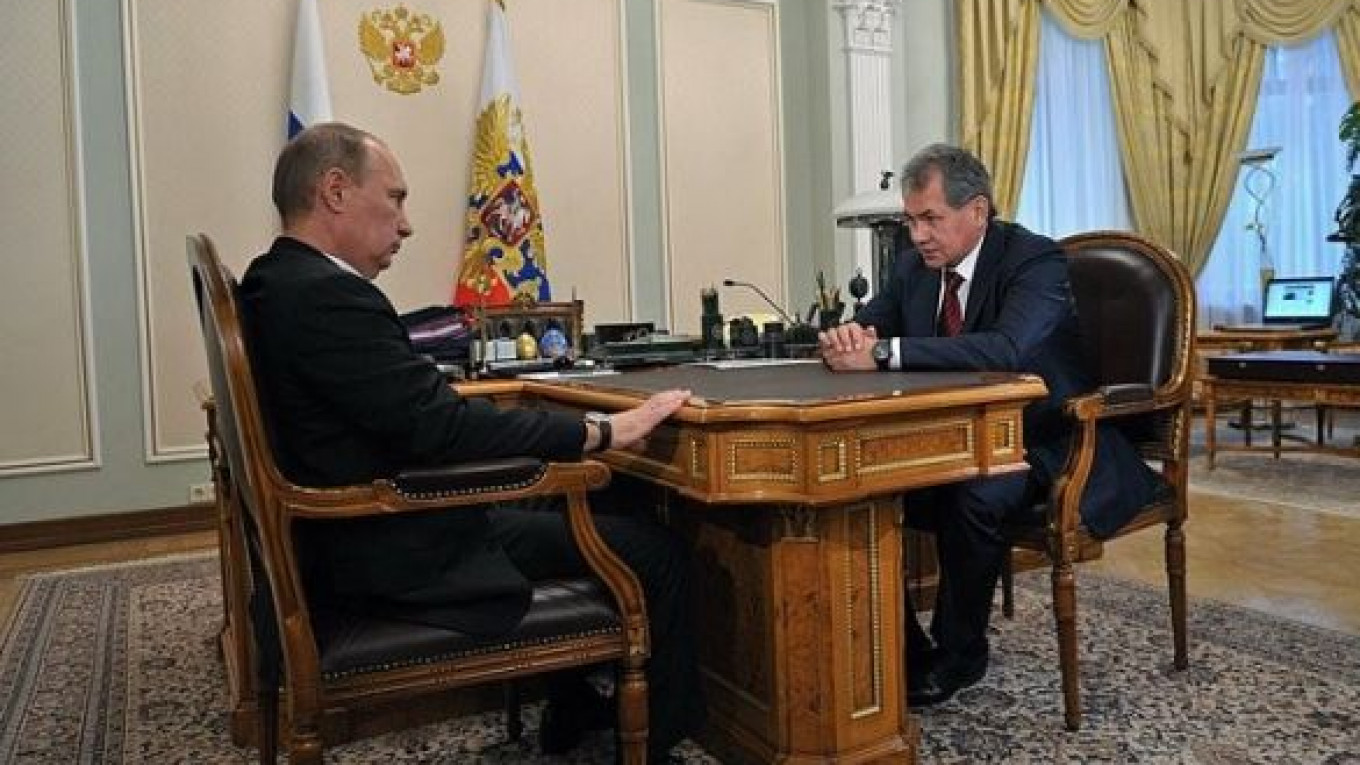Sergei Shoigu was off to a good start.
Since his appointment as Moscow region governor in May, the former Emergency Situations Minister improved management and set the troubled region on the road to economic modernization.
But these modest gains looked precarious on Tuesday after Shoigu was unexpectedly plucked from the post and appointed defense minister, leaving the Moscow region to be led by an obscure, longtime aide.
Gubernatorial elections were immediately set for September 2013, and political leaders of all stripes rushed in to fill a perceived power vacuum on Moscow's doorstep.
Despite significant foreign investment, the Moscow region has long suffered from lawlessness and violence, as well as income inequality and corruption, particularly in the development sector.
Against this backdrop, Shoigu's tenure was seen as a breath of fresh air, particularly coming after his predecessor, Boris Gromov, whose 12 years in office seemed increasingly to combine the worst of Moscow snarl and the stagnation of the regions.
The murder of Sergiyev Posad Mayor Yevgeny Dushko, gunned down in August 2011 shortly after he accused local businessmen and officials of corruption, seemed indicative of region-wide malaise.
One of Shoigu's major accomplishments appears to have been the removal of several controversial officials, including Khimki Mayor Vladimir Strelchenko, whom critics tied to attacks on two environmental activists and a journalist, charges Strelchenko has denied.
Shoigu "got rid of a few of the most infamous figures. … At least he seemed to be working in that direction," said Masha Lipman, an analyst at the Moscow Carnegie Center, adding that he oversaw elections in Khimki in October that were fair by Russian standards.
Shoigu also began to modernize economic policies, focusing on strategic planning in cooperation with Moscow city officials, said Darrell Stanaford, chairman of the Urban Land Institute in Russia.
"I don't expect the policy to change. The question is, will somebody who doesn't have the same level of authority, recognition and popularity as Shoigu be able to push as hard and as fast?" Stanaford said.
Foreign investment in the Moscow region reached $2.59 billion in 2011, including from major players such as Ikea, Auchan, Leroy Merlin and John Deere.
"It's a typical region because it's amazingly diverse. Some pockets are among the wealthiest in Russia, and some very provincial," Lipman said.
In July, Moscow gobbled up 148,000 hectares of the Moscow region on its southwest border, more than doubling in size as a result.
Shoigu has been replaced by his long-time associate, Deputy Governor Ruslan Tsalikov, who on Tuesday was appointed acting governor, according to a statement on the regional government's website.
Tsalikov, 56, a native of North Ossetia and an economist by training, served as finance minister of North Ossetia before joining the newly created Emergency Situations Ministry in 1994.
He served alongside Shoigu, who headed the ministry from 1994 until earlier this year, including as Shoigu's first deputy minister from 2007 onwards, according to his official biography.
But Tsalikov is unlikely to participate in September elections, said Alexei Titkov, an analyst at the Institute for Regional Politics.
"He doesn't look like the type of person who could win. … It's not yet clear whether he'll be the official choice, or whether he'll be a temporary, technical figure," Titkov said, adding that the Kremlin might steer a federal politician or powerful businessman into the job.
The election campaign appeared to begin almost immediately on Tuesday, with opposition leaders and major political parties, including the ruling United Russia party, vowing a competitive race.
We "need a single opposition candidate," tweeted opposition leader Sergei Udaltsov, who was recently elected to the opposition's new 45-member coordinating council.
Another opposition leader, Yevgenia Chirikova, who rose to prominence fighting a road development project through a forest in Khimki, where she lost mayoral elections last month, said she hadn't decided whether to run for governor.
Related articles:
A Message from The Moscow Times:
Dear readers,
We are facing unprecedented challenges. Russia's Prosecutor General's Office has designated The Moscow Times as an "undesirable" organization, criminalizing our work and putting our staff at risk of prosecution. This follows our earlier unjust labeling as a "foreign agent."
These actions are direct attempts to silence independent journalism in Russia. The authorities claim our work "discredits the decisions of the Russian leadership." We see things differently: we strive to provide accurate, unbiased reporting on Russia.
We, the journalists of The Moscow Times, refuse to be silenced. But to continue our work, we need your help.
Your support, no matter how small, makes a world of difference. If you can, please support us monthly starting from just $2. It's quick to set up, and every contribution makes a significant impact.
By supporting The Moscow Times, you're defending open, independent journalism in the face of repression. Thank you for standing with us.
Remind me later.






